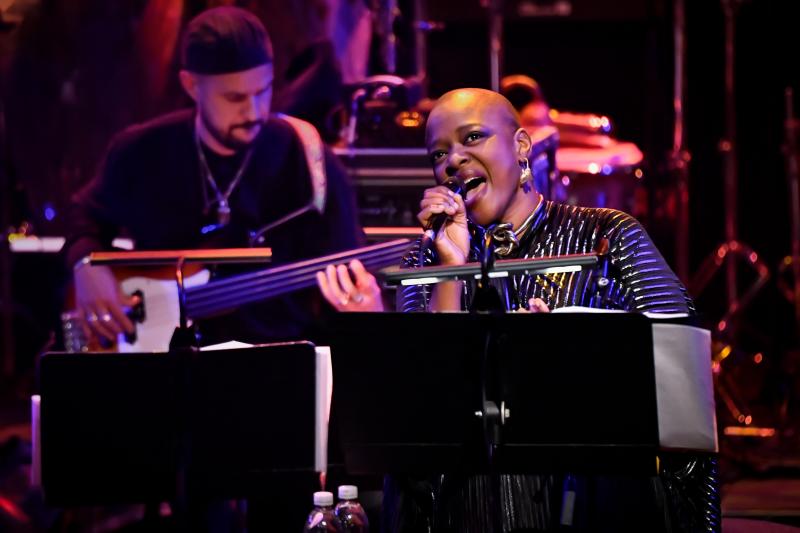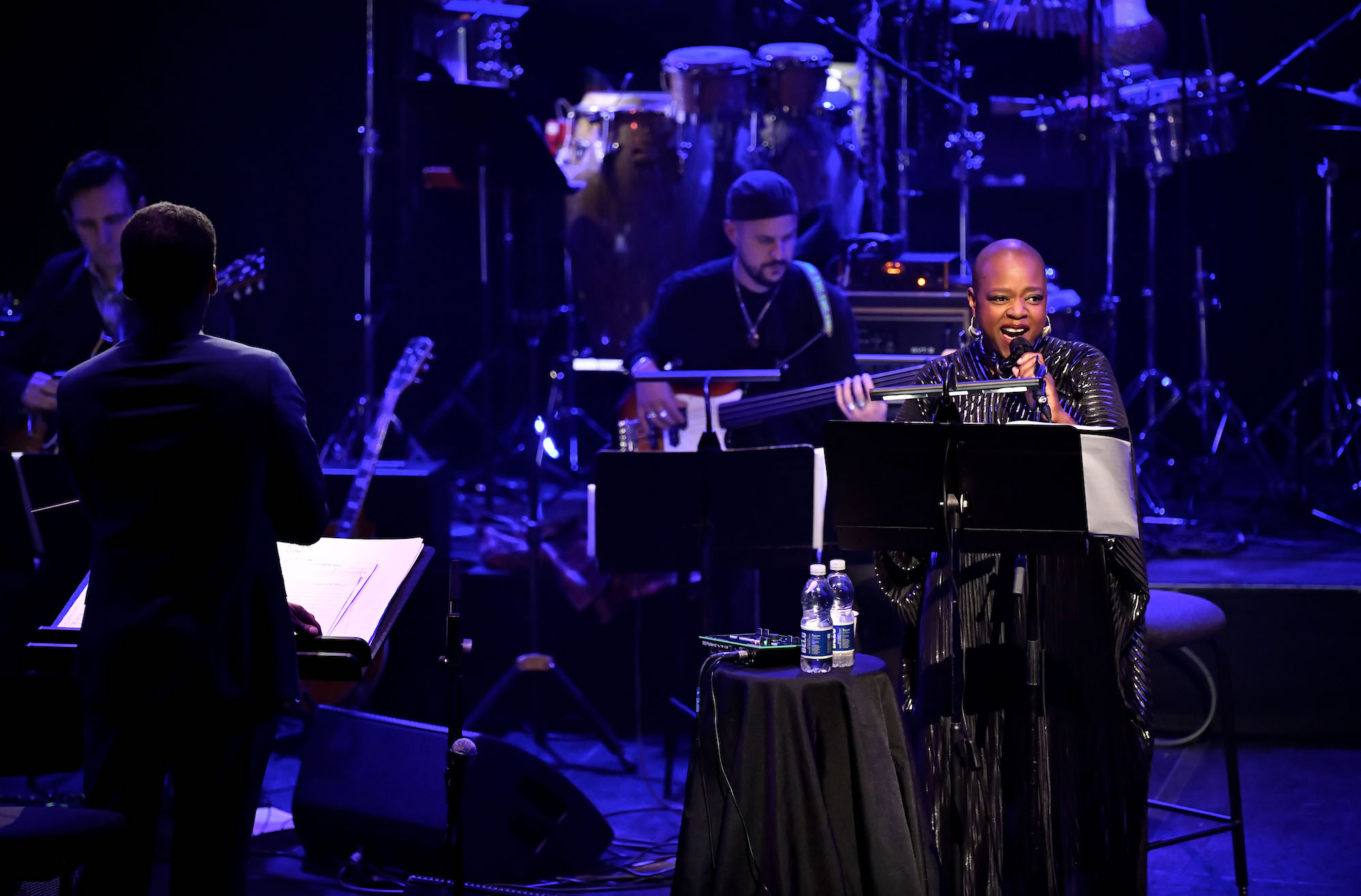Nu Civilisation Orchestra & ESKA: 'Hejira' and 'Mingus', Poole Lighthouse review - redistributing the future | reviews, news & interviews
Nu Civilisation Orchestra & ESKA: 'Hejira' and 'Mingus', Poole Lighthouse review - redistributing the future
Nu Civilisation Orchestra & ESKA: 'Hejira' and 'Mingus', Poole Lighthouse review - redistributing the future
Joni Mitchell re-interpreted - can a 19-piece band rise to some of the most challenging material of the 20th century?

I had high hopes for this show. After all, Eska Mtungwazi is pretty much the only singer on earth I’d go out of my way to hear sing Joni Mitchell songs.
Not only does she have the necessary vocal range and control, but her own sole solo album sits exactly in the right intersection of folk, jazz and experimental songwriting to suggest she’s got the stylistic fluidity to carry it off. And she’s an amazing performer. She may have only made that one album in 2015, but her work with everyone from Grace Jones and UNKLE to Tony Allen and Matthew Herbert over many years has demonstrated that she’s one of the most consistently potent voices in the UK.
Nonetheless, there was some trepidation. The extensive history of bad jazz versions of "Both Sides Now" and "Case of You" leave the gag reflex very oversensitised when it comes to this kind of endeavour. And this show focuses entirely on material from Mitchell’s most esoteric period – the Hejira and Mingus albums. On the one hand, they’re her most jazz records, so should lend themselves to interesting interpretation – but on the other they’re her most complex and tangled writing, which could all too easily invite over-indulgent formlessness.
There weren’t any instant answers as to which way it would go. The show eased in with a rather reserved intro spiel from musical director Peter Edwards, then the Nu Civilisation Orchestra delivering an elegant instrumental take on “Chair in the Sky”, then Eska joining them for “Coyote”. So far, so good, but it was all played pretty straight: the intro felt like a slickly-delivered overture, and “Coyote” was more or less a straight cover.  It was peculiar: perhaps thanks to the footage of her performing it onstage and off in The Last Waltz, “Coyote” has always felt tied to Mitchell’s presence, and to a certain “Seventies-ness”. So there was a bit of a disconnect between a Black woman fronting a modern British jazz ensemble, and Mitchell’s of-its-time, autobiographical storytelling. Or there was at first, anyway. Both Eska and the orchestra warmed up as they went, and then just at the end there was a moment.
It was peculiar: perhaps thanks to the footage of her performing it onstage and off in The Last Waltz, “Coyote” has always felt tied to Mitchell’s presence, and to a certain “Seventies-ness”. So there was a bit of a disconnect between a Black woman fronting a modern British jazz ensemble, and Mitchell’s of-its-time, autobiographical storytelling. Or there was at first, anyway. Both Eska and the orchestra warmed up as they went, and then just at the end there was a moment.
As Eska sung of “this flame you put here in this Eskimo” there was a distinct glint in her eye: the clearest possible acknowledgement that she was fully appraised of all the layers of meaning and irony in taking on the persona of an aloof Norwegian-Canadian who herself had shamelessly appropriated jazz and elements of Black American identity as part of the her eternal flight from protestant prairie conservatism. And she was having a lot of fun with it.
From that moment in there was no question that this was not a straight covers set, and there was barely room to breathe between stunning musical moments. Eska’s scatting locked in with inhuman precision to bass and bongoes on “The Dry Cleaner from Des Moines”. Her facial expressions alone giving new life to the poetry of “Hejira” – “Each so deep and superficial / Between the forceps and the stone”. The total funk in interjections of “oh yeah” and “ahahaha” in “Furry Sings the Blues.”
And not one second of the arrangements or playing was wasted either. The way “Refuge” dropped right down to just the string section then reforms piece by piece. Giorgio Serci’s guitar finding the right tone for everything from liquid balladry to abstract skronk to from-the-heart country twang on a devastating “Amelia”. Jihad Imroel-Quays Darwish bravely taking the Jaco Pastorius role on bass, without simply imitating Jaco. Eska herself casually controlling astounding electronic processing on her own voice, playing tricks where you’d start to wonder what is digital and what is her own vocal control.
The apocalyptic dreams of “The Wolf That Lives in Lindsey” rendered extra hallucinatory by Tello Morgado’s stroked and shaken percussion that seemed freeform but again proved to be locked in with Eska’s every whisper and inhalation. And on it went, through an effortlessly funked-up finale of “Black Crow” and encore of “God Must be a Boogie Man” with Edwards – by this time having revealed his reserve as hiding a potent dry wit – drawing the audience into the ritual. And there was so much more besides. Not one of the 19 people on stage failed to make vital contributions, not one note was wasted, it was extraordinary.
The science fiction writer William Gibson famously remarked that “the future is already here, it’s just unevenly distributed”. And some music demonstrates that principle as powerfully as anything. Charles Mingus’s music even from the 1950s contains such concentrated doses of the future it can still sound like alien technology today – and Mitchell in the 1970s managed to plug into his wellspring of inspiration and again tune even further into the future. And Eska – dressed like a sci-fi priestess in a different black and reflective couture outfit for each half of the show – took that baton and ran with it, as did every part of the appropriately named Nu Civilisation Orchestra. Exceeding all hopes, this made Mingus and Mitchell’s visions as vivid as they’ve ever been, and as breathtakingly advanced. An unbelievable experience. If you get the chance to see this, do not miss it.
rating
Share this article
The future of Arts Journalism
You can stop theartsdesk.com closing!
We urgently need financing to survive. Our fundraising drive has thus far raised £49,000 but we need to reach £100,000 or we will be forced to close. Please contribute here: https://gofund.me/c3f6033d
And if you can forward this information to anyone who might assist, we’d be grateful.

Subscribe to theartsdesk.com
Thank you for continuing to read our work on theartsdesk.com. For unlimited access to every article in its entirety, including our archive of more than 15,000 pieces, we're asking for £5 per month or £40 per year. We feel it's a very good deal, and hope you do too.
To take a subscription now simply click here.
And if you're looking for that extra gift for a friend or family member, why not treat them to a theartsdesk.com gift subscription?
more New music
 Pop Will Eat Itself, O2 Institute, Birmingham review - Poppies are back on patrol
PWEI hit home turf and blow the place up
Pop Will Eat Itself, O2 Institute, Birmingham review - Poppies are back on patrol
PWEI hit home turf and blow the place up
 'Fevereaten' sees gothic punk-metallers Witch Fever revel in atmospheric paganist raging
Second album from heavy-riffing quartet expands sonically on their debut
'Fevereaten' sees gothic punk-metallers Witch Fever revel in atmospheric paganist raging
Second album from heavy-riffing quartet expands sonically on their debut
 theartsdesk Q&A: Soft Cell
Upon the untimely passing of Dave Ball we revisit our September 2018 Soft Cell interview
theartsdesk Q&A: Soft Cell
Upon the untimely passing of Dave Ball we revisit our September 2018 Soft Cell interview
 Demi Lovato's ninth album, 'It's Not That Deep', goes for a frolic on the dancefloor
US pop icon's latest is full of unpretentious pop-club bangers
Demi Lovato's ninth album, 'It's Not That Deep', goes for a frolic on the dancefloor
US pop icon's latest is full of unpretentious pop-club bangers
 Yazmin Lacey confirms her place in a vital soul movement with 'Teal Dreams'
Intimacy and rich poetry on UK soul star's second LP
Yazmin Lacey confirms her place in a vital soul movement with 'Teal Dreams'
Intimacy and rich poetry on UK soul star's second LP
 Solar Eyes, Hare & Hounds, Birmingham review - local lads lay down some new tunes for a home crowd
Psychedelic indie dance music marinated in swirling dry ice
Solar Eyes, Hare & Hounds, Birmingham review - local lads lay down some new tunes for a home crowd
Psychedelic indie dance music marinated in swirling dry ice
 The Lemonheads' 'Love Chant' is a fine return to form
Evan Dando finally gets back in the saddle with an album of new tunes
The Lemonheads' 'Love Chant' is a fine return to form
Evan Dando finally gets back in the saddle with an album of new tunes
 Music Reissues Weekly: Evie Sands - I Can’t Let Go
Diligent, treasure-packed tribute to one of Sixties’ America’s great vocal stylists
Music Reissues Weekly: Evie Sands - I Can’t Let Go
Diligent, treasure-packed tribute to one of Sixties’ America’s great vocal stylists
 'Deadbeat': Tame Impala's downbeat rave-inspired latest
Fifth album from Australian project grooves but falls flat
'Deadbeat': Tame Impala's downbeat rave-inspired latest
Fifth album from Australian project grooves but falls flat
 Heartbreak and soaring beauty on Chrissie Hynde & Pals' Duets Special
The great Pretender at her most romantic and on the form of her life
Heartbreak and soaring beauty on Chrissie Hynde & Pals' Duets Special
The great Pretender at her most romantic and on the form of her life
 The Last Dinner Party's 'From the Pyre' is as enjoyable as it is over-the-top
Musically sophisticated five-piece ramp up the excesses but remain contagiously pop
The Last Dinner Party's 'From the Pyre' is as enjoyable as it is over-the-top
Musically sophisticated five-piece ramp up the excesses but remain contagiously pop
 Moroccan Gnawa comes to Manhattan with 'Saha Gnawa'
Trance and tradition meet Afrofuturism in Manhattan
Moroccan Gnawa comes to Manhattan with 'Saha Gnawa'
Trance and tradition meet Afrofuturism in Manhattan

Add comment